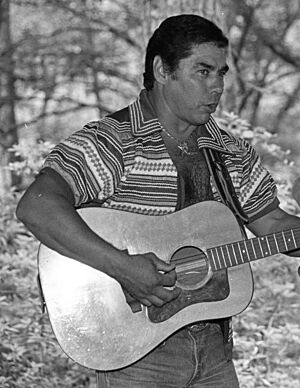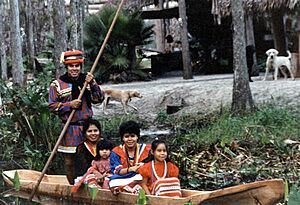James E. Billie facts for kids
Quick facts for kids
James E. Billie
|
|
|---|---|

Billie in 1983
|
|
| 4th and 6th Tribal Council Chairman of the Seminole Tribe of Florida | |
| In office 2011–2016 |
|
| Preceded by | Mitchell Cypress |
| Succeeded by | Marcellus Osceola Jr. |
| In office 1979–2001 |
|
| Preceded by | Howard Tommie |
| Succeeded by | Mitchell Cypress |
| Personal details | |
| Born | March 20, 1944 Dania, Florida |
James Edward Billie (born March 20, 1944), known as Chief Jim Billie, is a leader who guided the Seminole Tribe of Florida. He served as the tribe's Chairman from 1979 to 2001. He was re-elected to this important role from 2011 to 2016.
His first time as Chairman lasted 22 years. This was one of the longest times any elected leader in the Western Hemisphere had served. In 2001, he was removed from his position. Later, he won a lawsuit and received $600,000, showing the reasons for his removal were not valid. In 2011, he was re-elected with almost 60% of the votes.
In 2005, Sarasota Magazine called Chief Billie "the most powerful Native American leader of the past century." He is famous for helping the tribe win a big court case in 1996. This case, Seminole Tribe of Florida v. Florida, confirmed the tribe's right to govern itself. In 2019, he received a Florida Folk Heritage Award.
Contents
Early Life and Education
Jim Billie was born in 1944 in a simple camp near Dania, Florida. His mother, Agnes Billie, was Seminole and part of the Bird clan. His father was a white sailor. Agnes named him Whookipee, which means "He who has been taken away."
When he was a baby, some Seminole medicine men wanted to leave him in the Everglades. They did not approve of children with mixed heritage. But his mother and another young woman, Betty Mae Tiger Jumper, stepped in and saved his life.
Even though he had a white father, Jim Billie was part of his mother's Bird clan because of the Seminole matrilineal system. This means children belong to their mother's family group. He learned the traditional Seminole ways as he grew up.
When he was nine, his mother passed away, and he became an orphan. However, several families from the Bird clan took care of him. By age fourteen, he was wrestling alligators in tourist shows to earn money. He also loved music and later created his own songs.
At 19, in 1965, he joined the United States Army. He served in special units during the Vietnam War.
Career and Tribal Leadership
After returning to Florida, Billie worked different jobs on the Seminole reservation. He became interested in his heritage and spoke about Seminole traditions. He started a successful business building chickees, which are traditional open-sided houses. He also managed the Seminole Indian Village in Hollywood.
He soon became involved in tribal politics. He was first elected to the General Council.
Leading the Tribe's Growth
In 1979, Jim Billie was elected Chairman of the Seminole Tribe. He led the tribe through important legal challenges. These challenges were about the tribe's right to have high-stakes bingo games. The tribe won these cases, showing its right as a sovereign nation to have gambling. This was at a time when gambling was mostly illegal in many places.
The success of these gaming operations brought a lot of money to the Seminole Tribe. Many other Native American tribes followed their example.

In 1988, the Indian Gaming Regulatory Act (IGRA) was passed. This law set federal rules for tribal gaming. In 1996, the Seminole Tribe won a major case in the U.S. Supreme Court, Seminole Tribe of Florida v. Florida. This case confirmed the tribe's sovereign rights. It meant the state could not regulate the tribe's gaming outside of the IGRA.
During the 1980s, Billie used his military training to create a Seminole self-defense force. This group patrolled the Florida Everglades. They looked for people using tribal lands for illegal activities. This force later became the Seminole Tribe's official police force, which Billie founded.
As the tribe's income grew, they built a large five-story administration building. The Tribal Council was pleased with the tribe's success under Billie's leadership. They raised his yearly salary to $330,000, making him the highest-paid elected official in Florida at the time.
In 2001, the Seminole Council removed Billie from his position. The St. Petersburg Times wrote articles about him, and the FBI investigated him. However, the tribe's court case against him did not continue after he was removed from the council in 2003. That same year, he sued the Council and was awarded $600,000 in damages by the Seminole Tribe.
By 2005, an audit showed the Seminole Tribe had earned $1.1 billion in revenue that year. In 2007, the tribe bought the Hard Rock Cafe franchise. This included restaurants, hotels, and casinos around the world. By 2011, the Sun Sentinel estimated the tribe's total earnings were in the billions of dollars and still growing.
In 2011, Billie ran for Chairman again and won. He defeated Mitchell Cypress, who had been Chairman for two terms. Billie received 58.4 percent of the votes. He served as Chairman until September 2016.
Business Ventures
After leaving the chairmanship in 2016, Billie returned to his business. He continued building traditional chickee open houses through his Jim Billie Seminole Indian Chiki Huts company. This was his first business before he entered tribal politics.
In 2005, Billie was hired as the CEO of Micco Aircraft Company. This company, based in Oklahoma, makes recreational aircraft.
Personal Life and Music
Jim Billie has eight children. He lives near Lake Okeechobee on reservation lands with his wife, Maria, and their two children, Eecho and AUBEE.
Besides his work in politics and business, Billie is also a musician and songwriter. His band, The Shack Daddies, plays a style of music he calls "swamp-rock." In 1999, he was nominated for a Grammy Award for his song "Big Alligator." This song was on his album, Alligator Tears.
In 1999, Billie helped the band Phish organize their two-day New Year's Eve festival. This event took place at the Big Cypress Indian Reservation. About 80,000 fans attended. Billie performed two of his songs with Phish during their December 30 performance.
In February 2012, Billie had a stroke. This caused him to temporarily step away from his office.
Awards and Recognition
- 1999: Nominated for a Grammy Award for his song "Big Alligator."
- 1999: Received the Outstanding Music Achievement award from the First American in Arts Council.
- 1999: Honored as a Living Legend by the Native American Music Awards.
 | Isaac Myers |
 | D. Hamilton Jackson |
 | A. Philip Randolph |


